If you’ve ever felt like your clinic is drowning in paperwork while patients wait longer for the care they deserve, then you are facing the same issue many developing country medical facilities encounter.
And Singapore is not an exception in this.
While clinics and hospitals are seeing a rapid rise in innovation and technology. Primitive clinics still face the pressure of waiting patients. As the country deals with chronic conditions, aging patients, and administrative complexity, the expectation know boundary of a normal Singaporean citizen.
To be able to rise above those expectations is what clinics are looking for.
A resolution to this is patient data. Many clinics utilize it for various applications such as reducing follow-up delays and savings hours of admin time. But if used carelessly without a proper safety net, it can damage the trust and the reputation of the hospital at risk.

Just ask the 1.5 million patients affected by one of Singapore’s largest-ever healthcare data breaches in 2018. The ethics of maintaining crucial data, now, is not limited to IT concerns but a care concern.
There’s no need to take stress, Singapore is out that dark era, and it is quickly turning things with national framework initiatives such as National Electronic Health Record (NEHR) and Healthier SG to enable ethically safe Singapore healthcare industry.
These initiatives have promoted preventive care and digital infrastructure. But the ethical and secure management of patient information systems is still a cause of concern for many clinics and hospitals.
This article dives into five ethical, real-world strategies for using patient data to boost clinic efficiency in Singapore, improve outcomes, and stay fully aligned with national data protection standards.
1. Coordinate Care Across Providers with NEHR Integration
Coordination in healthcare is what keeps it going for both patients and doctors. Without a connected system in place, healthcare data gets lost. Singapore’s answer to this was National Electronic Health Record (NEHR).
It is a centralized platform designed to keep patients’ information in one place where all healthcare professionals have a unified view of it.
Issues Faced Earlier
We all know inconsistent records are the biggest hurdles to achieving safe, timely care. It affects workflow majorly and brings out issues like repeated lab tests, missed allergy warnings, and delays in making critical treatment decisions.
For smaller clinics or family doctors, the lack of visibility often means relying on patient memory alone.
The Solution
NEHR solves this by acting as a single source of truth. It consolidates essential patient data such as:
- Medical and surgical history
- Allergies and medications
- Vaccination records
- Transparent diagnostic results with detailed discharge summaries
Being an open access platform, you as healthcare professional can access this data to eliminate repeat consultation and improve continuity of care. This level of coordination is especially powerful for healthcare data in Singapore where cross-institutional care is common and often rapid.
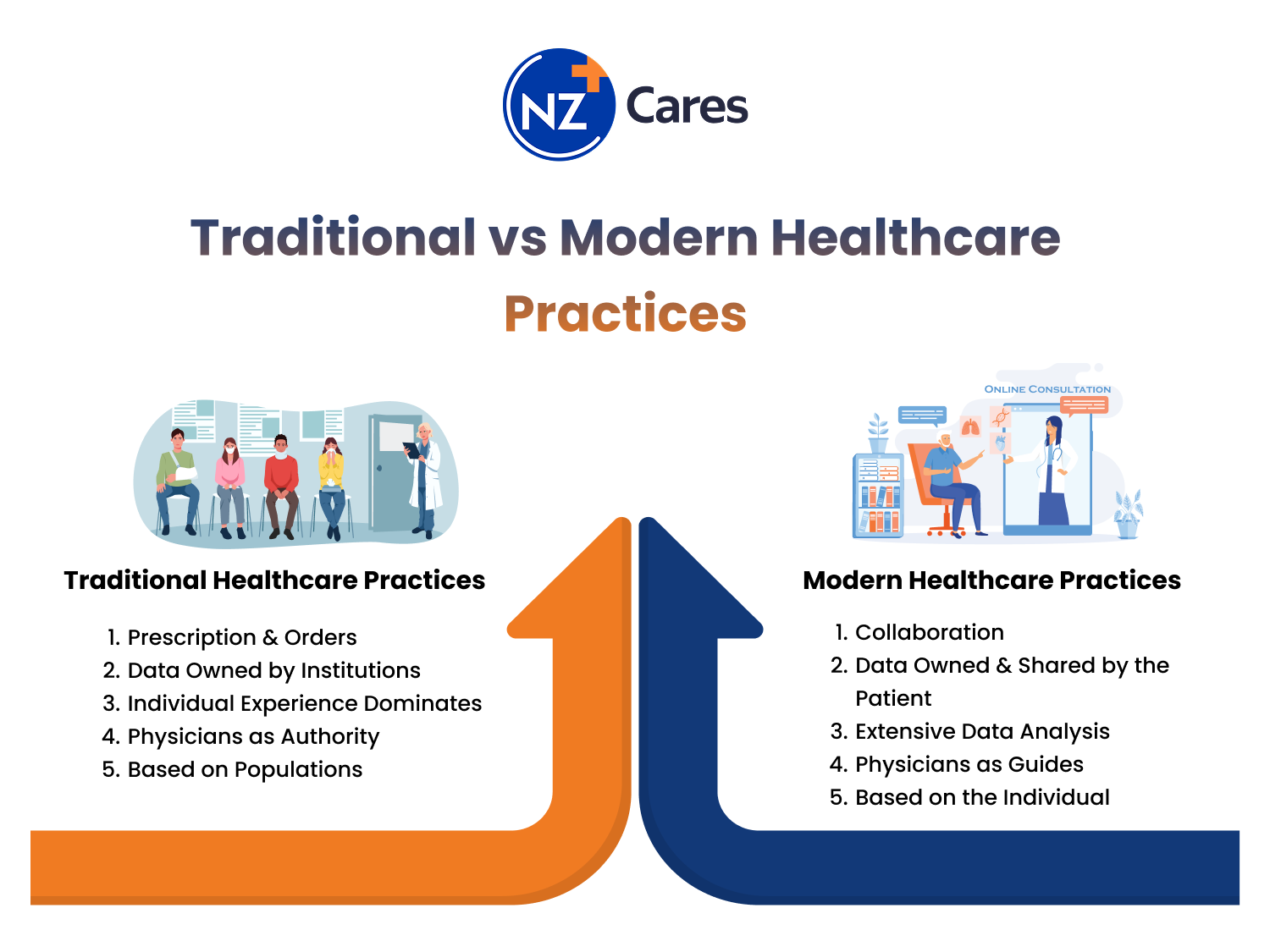
The Impact
Clinics and providers that actively use NEHR report measurable improvements:
- Fewer repeated tests
- Better medication reconciliation
- Faster, more accurate decisions in emergencies
- Up to 30% reduction in duplicate diagnostics
Now health tech in Singapore is actively utilizing the platform as coordinated workflow for their daily patient needs.
Read More: How to Cut Patient Wait Time from 60 Minutes to Just 15—Secret Revealed
2. Personalize Preventive Care Using Healthier SG Data
While reactive medicine treats illness, preventive care helps prevent it entirely.
With the rollout of Healthier SG, clinics now have access to a broader spectrum of lifestyle and community care data that can transform how they guide patients.
For instance, a patient with a history of early-stage hypertension, clinic can access this data with Healthier SG’s shared health records. There they can analyze blood pressure readings from a recent polyclinic visit and know that patients have missed a diet workshop check-up.
Healthier SG has revolutionized the general advice approach into hyper-relevant outreach based on each patient’s habits, environment, and risk level.
How to Use It
When used effectively, it can become a part of your workflow to help patients with long-term care planning:
- Send adaptive reminders for screenings and consultations
- Provide healthcare tips to patients with similar conditions.
- Prompt check-ins for patients flagged as high risk
All of this can be done seamlessly through integrated patient information management systems like NZCares PMS, which align outreach with clinical insights without adding to your team’s workload.
Ethical Consideration
Under Singapore’s strong data governance, clinics must always obtain informed consent before using Healthier SG data for outreach. Patients need to know how their data will be used, and they should always have the choice to opt out.
3. Automate Admin Tasks Without Compromising Privacy
Beyond the consultation room, healthcare teams are tired of admin work. From appointment scheduling to insurance processing, these routine tasks often consume more time than care itself for health tech in Singapore.
Manual logs, follow-up calls, paper forms, and many more menial tasks consume copious amounts of time, and as mentioned already, this is not healthcare is about.
It affects overall healthcare delivery and hampers the experience of patients who are not going to come back if your system stays like this.
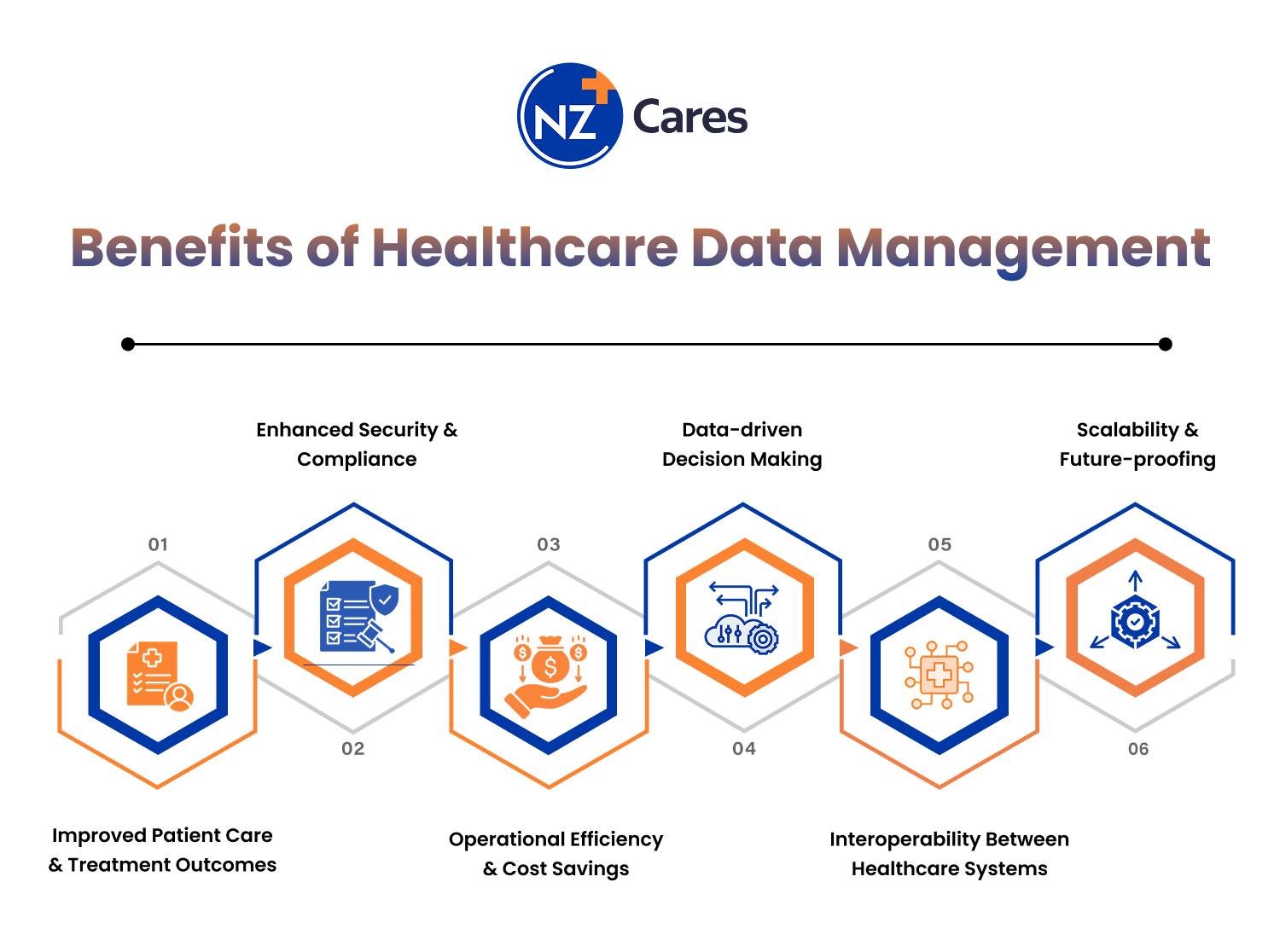
Automation of these tasks if done right can change that. When patient data is securely integrated:
- Insurance claims can be auto filled from medical records
- Billing codes can be generated based on diagnosis entries
- Test panels can be suggested based on reported symptoms
Modern platforms like NZCares PMS are built with privacy in mind and designed to comply with PDPA healthcare standards, making it easier to adopt automation without risk.
Result
Clinics that use data-powered automation report:
- Fewer manual errors
- Faster claims processing
- More time for patients, less for paperwork
Because every feature respects privacy from the ground up as it is efficient and ethical, too.
Bonus Read: How to Choose the Best Hospital Management Software in Singapore– Complete Guide
4. Identify Gaps in Care with Dashboards and Analytics
Good care is consistent care, and sometime, gaps emerge. They can easily go unnoticed unless actively trying to look for patterns such as missed follow-ups, no-shows, or unnecessary procedures.
The dashboard and analytics of HMS like NZCares make it easy and visible to you and your hospital staff. They present in-depth insights into daily appointments, schedules, and revenues which can uncover blind sport before they emerge as a problem.
By analyzing patient trends in aggregate, clinics can quickly identify:
- High no-show rates by age group or postcode
- Missed follow-ups for chronic illness patients
- Overuse or underuse of procedures, such as repeat imaging
These patterns can be addressed with the right operational changes or patient engagement strategies.
An anonymized and aggregated data focuses on system entries rather than individual to help you make evidence-based improvements to clinic workflows, staffing, or follow-up strategies.
5. Improve Continuity of Care Through Secure Messaging
Many patients are unintentionally overlooked or neglected due to errors in their workflow and lack of communication. They might miss the follow-up or not understand their medication changes. All this happens because of little miscommunication that grows into larger issues.
Secure messaging bridges that gap, allowing care teams to extend their presence beyond the clinic and support patients in real time. With access to patient history and consent, clinics can:
- Share bite-sized, relevant health education
- Send digital care plans post-visit to reinforce next steps
- Alert care teams when patients delay or skip refilling prescriptions
When integrated with your existing system, these messages become reminders and a part of an ongoing care relationship.
Caution to take
Of course, communication must never come at the cost of privacy. Clinics should use only secure, encrypted channels that align with Singapore clinic software standards. Consent should always be obtained from the patients before messaging begins.
Also, be mindful of what is shared between your patients and medical professionals.
Data Ethics: What Singapore Clinics Must Remember
With rising public awareness, clinics must go beyond basic compliance and actively earn patient trust. Singapore healthcare industry is constantly taking note of that.
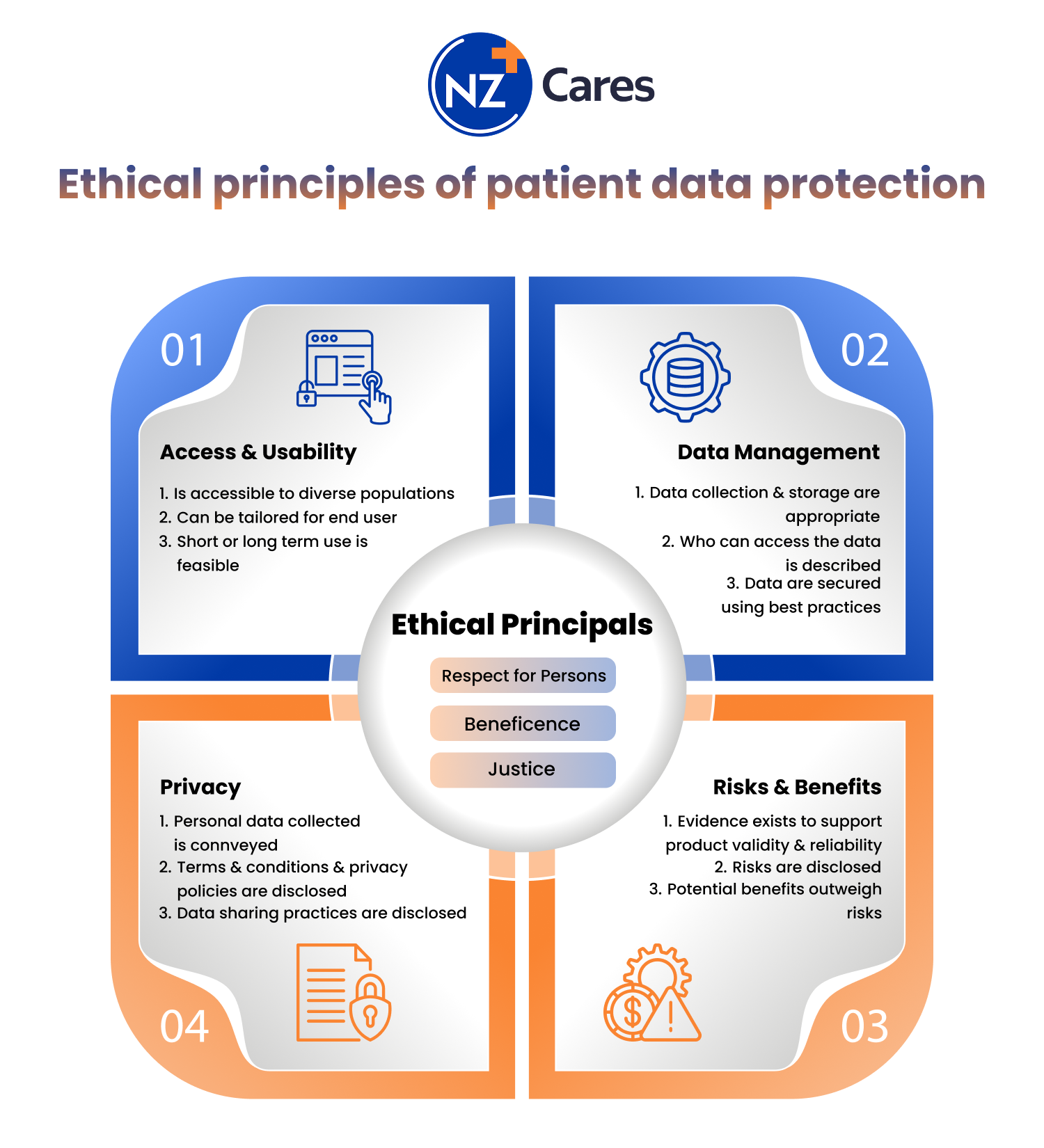
No doubt, the benefits of healthcare data in Singapore are immense, and they matter if patients feel secure.
- Consent and Transparency Are Non-Negotiable
PDPA compliance healthcare isn’t optional. Patients must know what is being collected, how it’s used, and give clear consent.
- Use Only What You Truly Need
Accessing patient records should never become routine. Stick to what is essential for diagnosis, treatment, or operational needs.
- Anonymize for Internal Use
When training staff or analyzing trends, strip out identifiable details. Respect for patient identity shouldn’t be a grey area.
- Communicate the ‘Why’ Clearly
You must inform the patients beforehand to know how their health details help improve results to build long-term trust.
The Power of NEHR + Healthier SG Together
The National Electronic Health Record (NEHR) was launched in 2011 to centralize patient health data across Singapore. In contrast, Healthier SG, rolled out in mid-2023, is all about proactive preventive care that is built around GPs and community health.
Where NEHR is clinical, Healthier SG is personal. And when they come together, the result is transformative.
NEHR gives doctors access to a patient’s medical history, regardless of where they were treated, while Healthier SG empowers citizens to manage their own health better. This integration means your clinic doesn’t just react; it plans. Not only does this streamline care, but it improves clinic efficiency in Singapore and outcomes alike.
- Doctors Deliver Hyper-Personalized Care
A full view of a patient’s lifestyle and medical history means more tailored treatment, not trial-and-error.
- Patients Feel More Involved
With clear goals and shared records; people understand easily, and act on their health plans.
- Clinics Operate with Greater Accuracy
Less guesswork, fewer repeated tests, and smarter consultations save time and money.
- Population Health Improves
Preventive care scales up, benefiting not just individuals, but entire communities.
Key Features of a NZCares Patient-Centric Data System
For clinics navigating the fast-paced demands of Singapore’s healthcare system, NZCares is a smart, patient-first solution. Designed with local challenges in mind, this AI-powered platform helps clinics move from reactive care to proactive, and data-led decisions
Unlike generic platforms, NZCares understands the nuances of Singapore clinic software It is practical, integrated, and focused on better patient outcomes.
- NEHR and Healthier SG Compatibility
Seamlessly aligns with Singapore’s national systems, ensuring continuity and compliance from day one.
- Consent-Based Data Sharing Tools
Data flows only with patient approval to keep privacy front and center.
- Role-Based Access to Records
Doctors, nurses, and admin staff see only what they need, reducing risk and maintaining ethical access.
- Built-In PDPA Compliance with Global Protection Laws
From data encryption to audit trails, the system is built around Singapore’s strict privacy laws, so you stay protected without added effort.
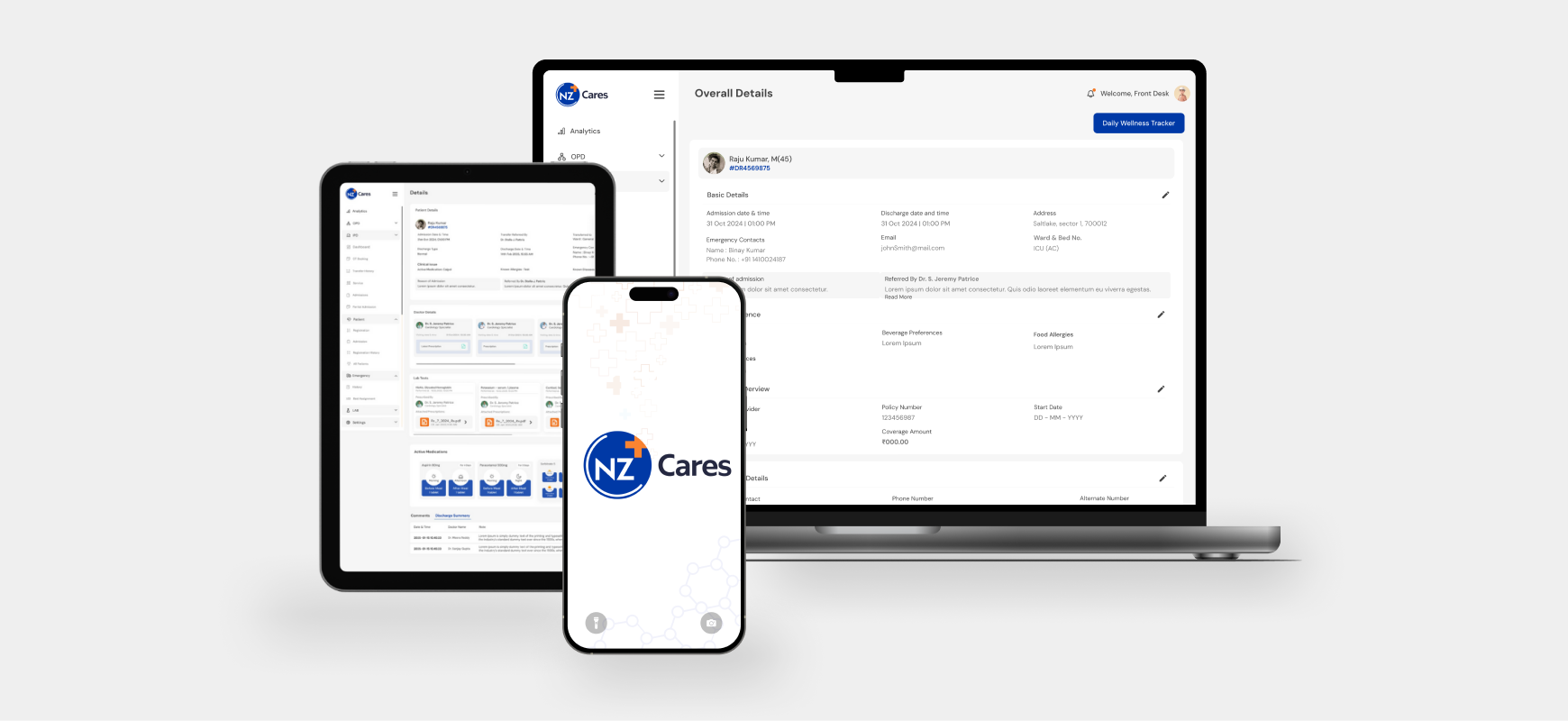
Real-World Use Case: How NZCares Enabled Smarter Care
To truly understand the impact of NZCares, look at what happened when one clinic adopted the platform to move beyond paper records and basic SMS reminders.
Before:
- Clinic relied on manual files and SMS reminders
- Missed follow-ups for chronic patients
- Staff overloaded with admin
After NZCares Clinic Software:
- Integrated with NEHR and Healthier SG for unified patient data
- Used predictive outreach based on patient information systems
- The software also reduced no-shows by up to 25% for the clinic
In just a few months, the reporting delay was reduced by 40% and the staff overtime dropped dramatically meanwhile keeping the data secure. 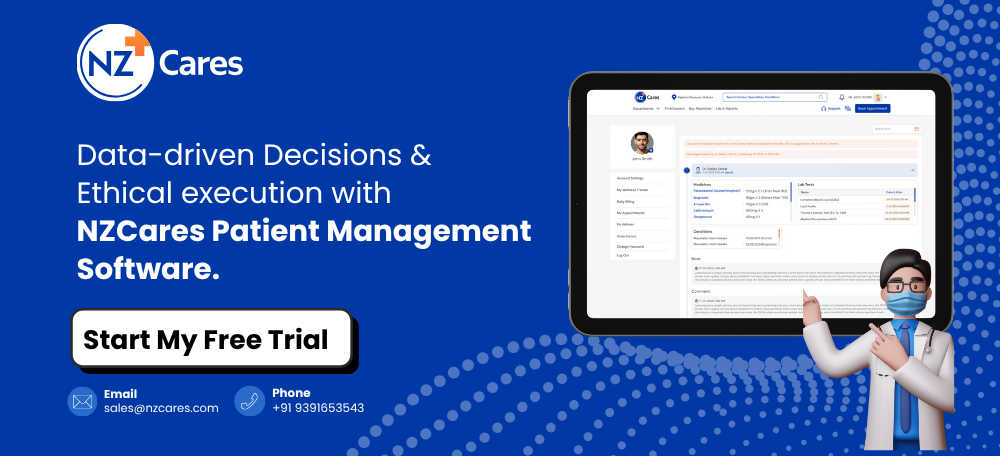
Conclusion
The healthcare industry is Singapore is one of the high-tech in the world and is only growing stronger. With a projected growth of $49 billion by 2029, the industry is driven by innovation, digital transformation, and smarter care delivery.
At the core of this progress lies healthcare data.
But as clinics and hospitals invest in patient information systems, they also walk a fine line of their patient data getting exposed. Such leaks open the door to patient mistrust and regulatory penalties. Your healthcare data in Singapore must be maintained responsibly and grounded in ethics.
The five strategies discussed above show how ethical data use can improve care quality, boost productivity, and align seamlessly with initiatives like NEHR and Healthier SG.
Platforms like NZCares are built with this future in mind. By simplifying data through intuitive tools and ensuring PDPA compliance healthcare, clinics focus less on admin and more on patients. In a fast-changing system, ethical innovation with HMS systems is the only way forward.